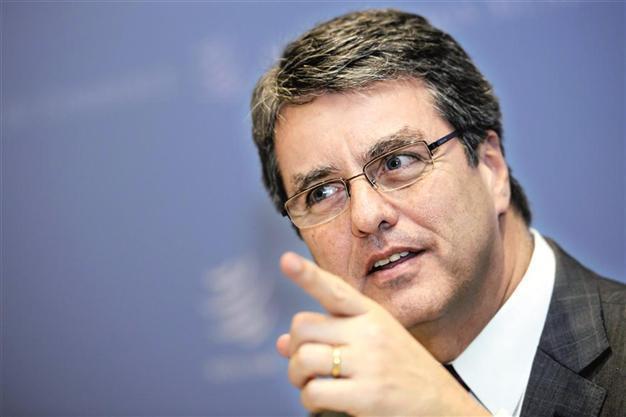Brazil becomes first BRICS nation to take head of WTO
GENEVA - Reuters

Brazil’s Roberto Azeve won on May 7 the leadership of the World Trade Organization. AFP photo
Brazil’s Roberto Azevedo has won the race to become the next head of the World Trade Organization, the first candidate from the BRICS club of emerging economies to take the job.
The career trade diplomat now faces a huge challenge to reinvigorate the global body, which has failed to wrap up the Doha trade liberalization talks after years of stalemate and risks becoming irrelevant without a breakthrough.
Azevedo beat Mexico’s Herminio Blanco, widely seen as the favored choice of the United, in the final round of the contest to succeed France’s Pascal Lamy, who steps down on Aug. 31.
The result of the selection process was meant to be secret until a formal announcement on Wednesday, but the Brazilian government confirmed on Tuesday that Azevedo, 55, won by a wide margin.
Azevedo will become the first Latin American and the first representative of a BRICS nation to head the Geneva-based trade body since its creation in 1995, a sign of the rising clout of emerging economies as developed countries struggle to recover from the 2008 financial crisis.
“For Brazil it is clear that, given his commitment and experience, he would be able to lead the organization toward a path of a fairer and more dynamic global economic order,” Brazilian President Dilma Rousseff said in a statement. “This is not a victory for Brazil, nor for a group of countries, but for the WTO.”
Brazil and Mexico, often seen as regional rivals, had pushed the case for their candidates, seeking to cement their status as growing powers.
Brazil’s ambassador to WTOAzevedo, who has been Brazil’s ambassador to the WTO, had touted his ability to listen to all sides in a negotiation and to find solutions by quietly building consensus, a contrast with Blanco’s idea of using the business sector to force governments to make deals happen.
“Selecting Roberto Azevedo means a lot to many in the WTO system who have been looking for a non-dogmatic perspective on trade liberalization,” said Ricardo Melendez-Ortiz, a former Colombian trade negotiator. “He’s probably more likely to be sympathetic to the views of African countries and developing countries that have been expecting delivery from the WTO on their issues ... That doesn’t mean his job is going to be simple,” he added.
Brazil, the world’s seventh largest economy, has taken a more gradual approach to trade liberalization that could be more appealing to developing nations. However, Brazil has been harshly criticized by other WTO members for raising duties on hundreds of imported goods and for favoring local producers in government purchases.
The global trade talks that began in Doha in 2001 reached deadlock in 2011, forcing the WTO to focus on a far smaller package of trade reforms and prompting many countries to pursue bilateral and regional trade deals instead, such as the U.S.-led Trans-Pacific Partnership. Even the smaller package of reforms, widely seen as a crucial first step, is proving hard to agree on. The WTO’s global rules risk getting drowned out by the plethora of regional deals now being negotiated.
